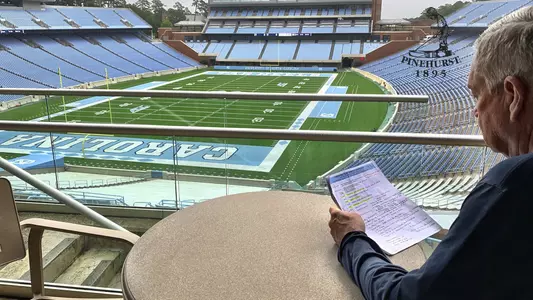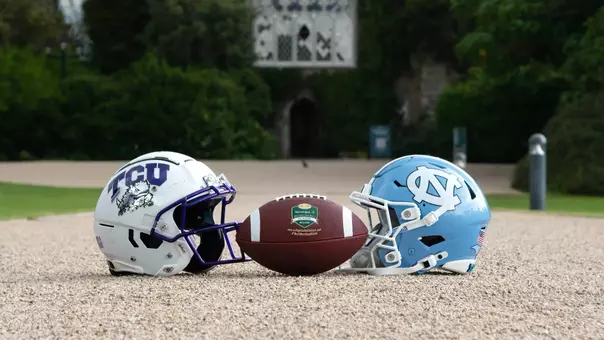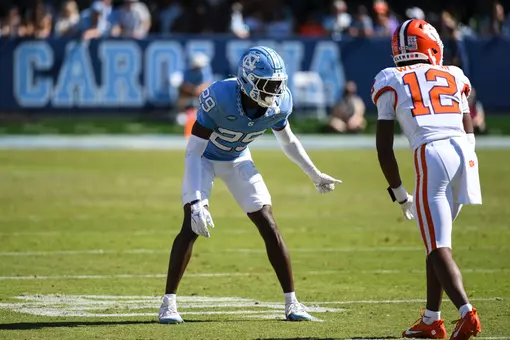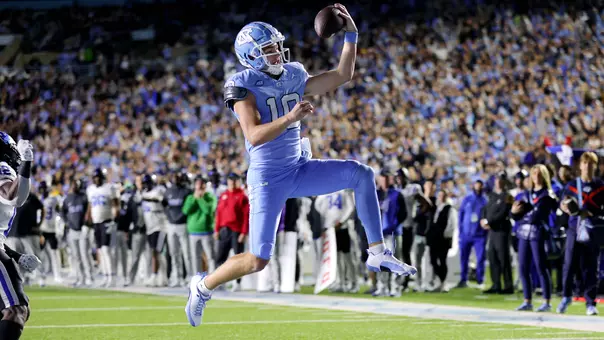University of North Carolina Athletics

Photo by: UNC Athletic Communications
Extra Points: Fine Print
August 19, 2019 | Football, Featured Writers, Extra Points
By Lee Pace
Mack Brown isn't certain how or why he acquired the ability to juggle so many balls at once, to manage a football program from a blimp hovering above and with a microscope on hands and knees. The ideas, he says, just seem to come. He's ravaged several forests with his lists and notes over three decades as a head coach and now types them into a pair of phones he keeps handy at all times. During an average practice, he might key in as few as 25 notes or twice that number that bear follow up with coaches, trainers, doctors, players or administrative staff. Brown's players at the University of Texas noted his proclivity for making these notes. "Coach is writing you up," one might say to another. "You're getting a ticket."
"Yesterday, it was 48," Brown said Saturday morning. "That's too much."
Unanswered is whether he meant too much sloppiness by those under him on the pecking order of Tar Heel football or too much pickiness on the part of the head coach.
"What do they call it, A.D.D?" he muses. "Maybe I have a touch of that. I can't walk past a picture if it's hanging crooked. I have to straighten it. I have to pick a scrap of paper off the ground. All my shirts and pullovers are hanging on wooden hangers. I hate to have different hangers. I like them all the same."
Brown enters the players' lounge on the second floor of Kenan Football Center. The room is a Petri dish of sorts of the marriage of his attention to the fine print and a football team that he's known for nine months and is trying to mold into a cohesive, disciplined, focused unit in time for its season-opener against the University of South Carolina.
One of Brown's first initiatives after taking the job last November was to overhaul the furniture and upgrade the toys. There are now two "pop-a-shot" basketball hoops and two "Energy Pods"—21st century recliners that vibrate and play soothing music and noises within a darkened capsule. The couches are softer than before, better venues for a quick nap during training camp.
"We're going to ask more of these guys than they've ever given," he says. "In return, we needed to make a commitment to them."
That comes with responsibility—keep it orderly and taut.
One morning in late July, Brown made an impromptu inspection and found the furniture out of place, Gatorade bottles on the floor and ping-pong paddles and pool cue sticks in disarray.
"By the discipline we've had in our players' lounge and locker room, we've won five games in two years," he told his players. "If we want to win every game, we've got to have better discipline. That fair? You can do that. I love the fact you're in there, having fun. Now let's keep it clean."
And one week later, he found everything military spit-polish.
"Great job, men," he said. "Totally clean. Not one thing out of place. I didn't touch anything, no chairs, no nothing. I don't want to pick anything up ever again."
And on this Saturday morning, exactly two weeks into training camp? Brown approaches one pool table, bends over and picks up a ball rack off the ground and puts it on its hanger. He puts two cue sticks in their proper place.
He smiles. "This is a process," he says. "Perfection one day. Try harder the next."
Brown reflects on his upbringing in Cookeville, Tenn., and how the values learned from his parents and grandparents formed the basis of his adult nature, and then adds the layers that followed over the years by reading books on structure and discipline from business and military leaders.
"My dad would not let me go through a door without opening it for someone," he says. "He would not let me say anything besides, 'Yes sir, no sir, yes ma'am, no ma'am.' He insisted I take my hat off if introduced to someone. My granddad would never walk by anyone without speaking or smiling. He used to say that people would always make an impression of you within 60 seconds of meeting you, so you'd better present yourself well.
"I've always tried to be good with names, too, to remember names and call people by name. I think that forces you to pay attention and be sharp."
One of Brown's favorite books is Make Your Bedby retired U.S. Naval Admiral William McRaven, who lives in Austin and is the former chancellor of the University of Texas System. The book is built around 10 principles McRaven learned in Navy Seal training, beginning with how the simple act of making your bed sets the stage for a productive day.
"He was in charge of the Seals, so he was pretty disciplined," Brown says. "You make your bed, you get up in the morning and do the little things right. You do as you're told. It translates to fewer penalties, fewer turnovers, fewer mental busts. It becomes who you are."
Brown told his players during their final team meeting of spring semester that his experience as a head coach forecast that two percent of them would not be back in August because of academic or disciplinary reasons. He congratulated them for all being present on July 31 check-in for training camp. He's cited the team's spring GPA as being the highest for the team in 11 years. Yet the quickest way to raise his ire during camp is to lose your cool or showboat.
"People ask, 'Why have we had so many unsportsmanlike penalties?'" Brown says. "Well, I wasn't here, but I suspect it's because we're not a very confident team. When you're not confident, that's what you do you. You show off. You're not winning so you get your validation by being a tough-ass and pushing someone late or saying something."
A defensive back intercepted a pass in one scrimmage and returned it for a touchdown but made the mistake of holding the ball up in the air before he crossed the goal line.
"That's 15 yards and the touchdown's wiped off," Brown says. "I asked him why he did it. He said, 'I was excited.' We've got to learn the difference between smart and excited."
A similar play occurred on what was scripted as a game-ending play. The defender, Patrice Rene, wasn't scolded for hot-dogging. But he didn't hit the turf, either, after picking the ball from the air.
"Patrice, you went to score, right?" Brown asked Rene. "Not on the last play. The game's over. Get on the ground. You keep running and someone can run up and strip it from you."
The players are buying in. And why not? They have lost 18 games in two years. In 2017, only seven FBS teams out of 129 had more penalty yards. In 2018, only 17 teams had a worse turnover margin.
"It's a universal concept, small things matter," says Rene. "Coach Brown definitely pays attention to details. That translates on and off the field. Keeping the locker room clean is all about accountability and discipline. It's helping the team get better for sure."
"We have to be consistent," adds tailback Michael Carter. "If someone comes into your house without the house being clean, it's a bad look. If we're not keeping it clean, then that's who we are. It's discipline. It's what good football teams do. They pick up the trash. It was a bad habit. You can't be a winner and have bad habits."
Tailback Antonio Williams remembers having read about NFL All-Pro safety Ed Reed going off on his Super Bowl championship teammates with the Baltimore Ravens to be diligent picking up towels off the floors in the locker room and shower area. At the time, the Ravens' dressing quarters were maintained by volunteer firemen from the community.
"You've got to respect the firemen! You've got to do the little things. Respect the firemen!" Reed implored his teammates.
"It allows us to take ownership in our home," Williams says. "Don't mess it up ourselves and don't let anyone else come in and mess it up. That translates to the field and to the games. We're taking care of our own. Like Ed Reed said, we're grown men. The locker room should be clean. The players' lounge should be clean. We want to be a championship team and we have to start with the little things."
Tommy Thipgen first experienced Brown when playing linebacker for the Tar Heels from 1989-92. Now he has a different perspective as the Carolina linebackers coach. He cites a recent practice drill when his linebackers were honing their footwork while catching balls and returning interceptions.
"He doesn't miss anything," Thigpen says. "No detail is too little. Coach was watching and said they need to tuck it away and secure the football. I was concentrating on the footwork, and Coach Brown caught the fine detail of what you do after the catch."
Brown's lists and ideas are not limited to the football field. Soon after taking the job, he lobbied Athletic Director Bubba Cunningham for the funds to not only refurbish the player's lounge but also the locker room and weight room. Those projects were completed in July. Now, he's overseeing a major overhaul of the wall decorations, graphics and framings in Kenan Football Center to better tie the visual appearance into a more cohesive and attractive look. There are two elevators in the building and four floors, so one point of emphasis is to add a strong "wow factor" each time someone exits an elevator.
"I've walked this building at every hour, three times a day sometimes," he says. "I'll try to be a recruit, a parent, a letterman, a donor. What would look good? We've had to add some splashes, things that make people say, 'I want to be a part of this.'"
One of his first orders of business, in fact, was to acquire something as simple and basic as a street address for the building, which was conceived, funded and under construction during the latter stages of Brown's 1988-97 original tenure at Carolina. The building opened for good in 1998 and since then has had the official address of "Bell Tower Parking Lot," which was not recognized on official University maps or GPS and map programs on cell phones.
Since the Kenan Football Center and the Sonja Hayes Stone Center for Black Culture and History share the same entry road off Raleigh Road in the center of campus, Brown thought naming the street for the Stone Center would be an appropriate gesture and flicked the switch within University channels to make it happen. It had personal meaning to him as he and his wife Sally were benefactors of the building in its early stages in the 1990s with words, actions and dollars.
"We didn't have an address to give recruits or parents," Brown says. "And I didn't like hanging balloons at the intersection."
Now the address if you want to visit Mack Brown and the Tar Heel football team is 1 Stone Center Drive, Chapel Hill.
It's just another detail in getting Tar Heel football back on the map.
Chapel Hill writer Lee Pace (UNC '79) is entering his 30th year writing "Extra Points" and 16th reporting from the sidelines for the Tar Heel Sports Network. Follow him @LeePaceTweet and email him at leepace7@gmail.com.
Mack Brown isn't certain how or why he acquired the ability to juggle so many balls at once, to manage a football program from a blimp hovering above and with a microscope on hands and knees. The ideas, he says, just seem to come. He's ravaged several forests with his lists and notes over three decades as a head coach and now types them into a pair of phones he keeps handy at all times. During an average practice, he might key in as few as 25 notes or twice that number that bear follow up with coaches, trainers, doctors, players or administrative staff. Brown's players at the University of Texas noted his proclivity for making these notes. "Coach is writing you up," one might say to another. "You're getting a ticket."
"Yesterday, it was 48," Brown said Saturday morning. "That's too much."
Unanswered is whether he meant too much sloppiness by those under him on the pecking order of Tar Heel football or too much pickiness on the part of the head coach.
"What do they call it, A.D.D?" he muses. "Maybe I have a touch of that. I can't walk past a picture if it's hanging crooked. I have to straighten it. I have to pick a scrap of paper off the ground. All my shirts and pullovers are hanging on wooden hangers. I hate to have different hangers. I like them all the same."
Brown enters the players' lounge on the second floor of Kenan Football Center. The room is a Petri dish of sorts of the marriage of his attention to the fine print and a football team that he's known for nine months and is trying to mold into a cohesive, disciplined, focused unit in time for its season-opener against the University of South Carolina.
One of Brown's first initiatives after taking the job last November was to overhaul the furniture and upgrade the toys. There are now two "pop-a-shot" basketball hoops and two "Energy Pods"—21st century recliners that vibrate and play soothing music and noises within a darkened capsule. The couches are softer than before, better venues for a quick nap during training camp.
"We're going to ask more of these guys than they've ever given," he says. "In return, we needed to make a commitment to them."
That comes with responsibility—keep it orderly and taut.
One morning in late July, Brown made an impromptu inspection and found the furniture out of place, Gatorade bottles on the floor and ping-pong paddles and pool cue sticks in disarray.
"By the discipline we've had in our players' lounge and locker room, we've won five games in two years," he told his players. "If we want to win every game, we've got to have better discipline. That fair? You can do that. I love the fact you're in there, having fun. Now let's keep it clean."
And one week later, he found everything military spit-polish.
"Great job, men," he said. "Totally clean. Not one thing out of place. I didn't touch anything, no chairs, no nothing. I don't want to pick anything up ever again."
And on this Saturday morning, exactly two weeks into training camp? Brown approaches one pool table, bends over and picks up a ball rack off the ground and puts it on its hanger. He puts two cue sticks in their proper place.
He smiles. "This is a process," he says. "Perfection one day. Try harder the next."
Brown reflects on his upbringing in Cookeville, Tenn., and how the values learned from his parents and grandparents formed the basis of his adult nature, and then adds the layers that followed over the years by reading books on structure and discipline from business and military leaders.
"My dad would not let me go through a door without opening it for someone," he says. "He would not let me say anything besides, 'Yes sir, no sir, yes ma'am, no ma'am.' He insisted I take my hat off if introduced to someone. My granddad would never walk by anyone without speaking or smiling. He used to say that people would always make an impression of you within 60 seconds of meeting you, so you'd better present yourself well.
"I've always tried to be good with names, too, to remember names and call people by name. I think that forces you to pay attention and be sharp."
One of Brown's favorite books is Make Your Bedby retired U.S. Naval Admiral William McRaven, who lives in Austin and is the former chancellor of the University of Texas System. The book is built around 10 principles McRaven learned in Navy Seal training, beginning with how the simple act of making your bed sets the stage for a productive day.
"He was in charge of the Seals, so he was pretty disciplined," Brown says. "You make your bed, you get up in the morning and do the little things right. You do as you're told. It translates to fewer penalties, fewer turnovers, fewer mental busts. It becomes who you are."
Brown told his players during their final team meeting of spring semester that his experience as a head coach forecast that two percent of them would not be back in August because of academic or disciplinary reasons. He congratulated them for all being present on July 31 check-in for training camp. He's cited the team's spring GPA as being the highest for the team in 11 years. Yet the quickest way to raise his ire during camp is to lose your cool or showboat.
"People ask, 'Why have we had so many unsportsmanlike penalties?'" Brown says. "Well, I wasn't here, but I suspect it's because we're not a very confident team. When you're not confident, that's what you do you. You show off. You're not winning so you get your validation by being a tough-ass and pushing someone late or saying something."
A defensive back intercepted a pass in one scrimmage and returned it for a touchdown but made the mistake of holding the ball up in the air before he crossed the goal line.
"That's 15 yards and the touchdown's wiped off," Brown says. "I asked him why he did it. He said, 'I was excited.' We've got to learn the difference between smart and excited."
A similar play occurred on what was scripted as a game-ending play. The defender, Patrice Rene, wasn't scolded for hot-dogging. But he didn't hit the turf, either, after picking the ball from the air.
"Patrice, you went to score, right?" Brown asked Rene. "Not on the last play. The game's over. Get on the ground. You keep running and someone can run up and strip it from you."
The players are buying in. And why not? They have lost 18 games in two years. In 2017, only seven FBS teams out of 129 had more penalty yards. In 2018, only 17 teams had a worse turnover margin.
"It's a universal concept, small things matter," says Rene. "Coach Brown definitely pays attention to details. That translates on and off the field. Keeping the locker room clean is all about accountability and discipline. It's helping the team get better for sure."
"We have to be consistent," adds tailback Michael Carter. "If someone comes into your house without the house being clean, it's a bad look. If we're not keeping it clean, then that's who we are. It's discipline. It's what good football teams do. They pick up the trash. It was a bad habit. You can't be a winner and have bad habits."
Tailback Antonio Williams remembers having read about NFL All-Pro safety Ed Reed going off on his Super Bowl championship teammates with the Baltimore Ravens to be diligent picking up towels off the floors in the locker room and shower area. At the time, the Ravens' dressing quarters were maintained by volunteer firemen from the community.
"You've got to respect the firemen! You've got to do the little things. Respect the firemen!" Reed implored his teammates.
"It allows us to take ownership in our home," Williams says. "Don't mess it up ourselves and don't let anyone else come in and mess it up. That translates to the field and to the games. We're taking care of our own. Like Ed Reed said, we're grown men. The locker room should be clean. The players' lounge should be clean. We want to be a championship team and we have to start with the little things."
Tommy Thipgen first experienced Brown when playing linebacker for the Tar Heels from 1989-92. Now he has a different perspective as the Carolina linebackers coach. He cites a recent practice drill when his linebackers were honing their footwork while catching balls and returning interceptions.
"He doesn't miss anything," Thigpen says. "No detail is too little. Coach was watching and said they need to tuck it away and secure the football. I was concentrating on the footwork, and Coach Brown caught the fine detail of what you do after the catch."
Brown's lists and ideas are not limited to the football field. Soon after taking the job, he lobbied Athletic Director Bubba Cunningham for the funds to not only refurbish the player's lounge but also the locker room and weight room. Those projects were completed in July. Now, he's overseeing a major overhaul of the wall decorations, graphics and framings in Kenan Football Center to better tie the visual appearance into a more cohesive and attractive look. There are two elevators in the building and four floors, so one point of emphasis is to add a strong "wow factor" each time someone exits an elevator.
"I've walked this building at every hour, three times a day sometimes," he says. "I'll try to be a recruit, a parent, a letterman, a donor. What would look good? We've had to add some splashes, things that make people say, 'I want to be a part of this.'"
One of his first orders of business, in fact, was to acquire something as simple and basic as a street address for the building, which was conceived, funded and under construction during the latter stages of Brown's 1988-97 original tenure at Carolina. The building opened for good in 1998 and since then has had the official address of "Bell Tower Parking Lot," which was not recognized on official University maps or GPS and map programs on cell phones.
Since the Kenan Football Center and the Sonja Hayes Stone Center for Black Culture and History share the same entry road off Raleigh Road in the center of campus, Brown thought naming the street for the Stone Center would be an appropriate gesture and flicked the switch within University channels to make it happen. It had personal meaning to him as he and his wife Sally were benefactors of the building in its early stages in the 1990s with words, actions and dollars.
"We didn't have an address to give recruits or parents," Brown says. "And I didn't like hanging balloons at the intersection."
Now the address if you want to visit Mack Brown and the Tar Heel football team is 1 Stone Center Drive, Chapel Hill.
It's just another detail in getting Tar Heel football back on the map.
Chapel Hill writer Lee Pace (UNC '79) is entering his 30th year writing "Extra Points" and 16th reporting from the sidelines for the Tar Heel Sports Network. Follow him @LeePaceTweet and email him at leepace7@gmail.com.
Players Mentioned
MBB: Hubert Davis Post-Clemson Press Conference
Wednesday, March 04
MBB: Brad Brownell Postgame Press Conference
Wednesday, March 04
RJ Davis in the Rafters - Full Halftime Ceremony - March 3, 2026
Wednesday, March 04
UNC Men's Basketball: Bogavac Leads Tar Heels By Clemson, 67-63
Wednesday, March 04

















